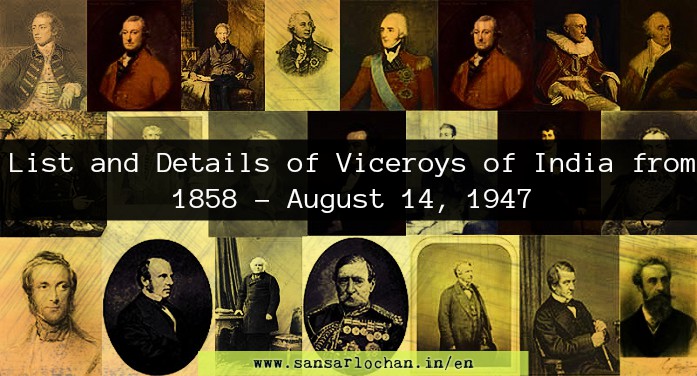Below is presented a brief information regarding the Viceroys of India who ruled from 1858 to 1947 and the main events that occured under their regimes. As we are aware the office of Viceroy was created in the aftermath of the upheaval of 1857. From 1858 onwards, the British Crown took the reins of administration in its hands and the Viceroys worked as deputees on its behalf. Lord Canning was the first Viceroy and the last of the chain was Lord Mountbatten. As the last Viceroy Mountbatten presided over the withdrawal of the British power from the Indian sub-continent. Interestingly this Viceroy was retained by the Indian politicians as the Governor General of India for some time as well.
Lord Canning, 1858-1862
Queen Victoria’s proclamation of 1858 led to transfer of the Government of India from the East India Company to the Crown. Canning’s work was “conciliation, settlement, reconstruction and reorganization”.
Lord Elgin, 1862-1863
Lord Lawrence, 1864-1869
His Afghan Policy was known as the Policy of “Masterly Inactivity”
Lord Lytton, 1876-1880
The Vernacular Press Act imposed certain reinstruction on the Indian Press. The Arms Act prohibited the Indians from carrying arms without a license. He is known for his reactionary spirit.
Lord Ripon, 1880-1884
a) Ripon was a true liberal of Gladstonian era. He symphathised with the Indians and encouraged their legitimate aspirations.
b) He repealed the Vernacular Press Act, passed the Local Self Government Act, took steps to improve primary and secondary schools, passed a Factory Act to protect the town labourers and sought to remove judicial disqualifications based on race and distinctions by the Ilbert Bill.
Lord Dufferin, 1884-1898
Lord Curzon, 1899-1905
a) Lord Curzon kept peaceful relations with the N.W. Frontier Tribes and Afghanistan.
b) He took effective steps to protect British interests in Persia.
c) The Tibetans were defeated by him, they had to pay a heavy war indemnity. Curzon allowed British Govt. to control their foreign policy.
d) Punjab Land Alienation Act was passed in 1900, by which the lands of cultivators could not be transferred to money-lenders or non-agriculturists by sale or mortgage.
e) By the Indian University Act (1904) Lord Curzon officialised the Universities, since they were to have a majority of nominated members on the Senate.
f) In 1905, he partitioned Bengal into two separate provinces – a) West Bengal b) Eastern Bengal and Assam. There were agitation all over the country against this partition which had to be annulled in 1911.
Lord Minto, 1905-1910
There was great political unrest in India. The Indian Councils Act of 1909 of Morley-Minto Reforms was half-hearted measure, and it failed to satisfy Indian political aspirations. Lord Minto conceded separate electorates to the Muslims in the legislatures.
Lord Hardinge, 1910-1916
Under his tenure following things happened:-
a) A Durbar was held at Delhi in December 1911 to celebrate the coronation of His Majesty King George V.
b) Partition of Bengal was cancelled.
c) Delhi was made the capital in place of Calcutta.
d) A bomb was thrown by some unknown person at the Viceroy who escaped unhurt.
Lord Chelmsford, 1916-1920
Under his tenure following things occurred:-
a) The Government of India Act 1919 popularly known as Montague Chelmsford Reforms was introduced
b) Rowlatt Act was introduced
c) Martial Law
d) Non-cooperation Movement
Lord Reading, 1921-1926
a) The visits of the Duke of Connaught and Prince of Wales to India were boycotted.
b) There was strong agitation (riots, strikes) and civil disobedience movements all over the country against the Government.
Lord Irvin, 1926-1931
Under his tenure following things occurred:-
a) Simon Commission’s visit to India in 1927 was boycotted by the people.
b) Resolution of complete independence for India was passed by the Indian National Congress at Lahore on 31st Dec. 1929.
c) Mass Civil Disobedience Movement started in 1930.
d) Round Table Conferences in London in 1930.
e) Gandhi-Irwin Pact in 1931
Lord Wellington, 1931-1936
a) Second Round Table Conference was held in London 1931.
b) Communal Award was announced by Ramsay MacDonald.
c) Mahatma Gandhi decided to fast unto death to remedy the defects of Communal Award.
d) Poona Pact was signed.
e) Third Round Table Conference was held in London in 1932.
Lord Linlithgow, 1936-1943
Under his tenure following things took place:-
a) The Govt of India Act, 1935 was enforced in the provinces in 1937.
b) Congress Ministries were formed in eight out of eleven major provinces.
c) Outbreak of World War 2
d) Congress Ministries resigned in 1939 as the Govt. did not clarify the war aims.
e) Cripps’ Reforms to India in March 1942 to discuss Indian constitutional reforms both during and after the war, it was a failure.
f) Quit India movement (8th August, 1942); disturbances all over the country
Lord Wavell, 1942-1947
a) Goodwill Mission to India
b) The Wavell Plan
c) Cabinet Mission Plan
d) End of World War II
e) First meeting of the Constituent Assembly was held on 9th December, 1946
Lord Louis Mountbatten, March 13, 1947-August 14, 1947
a) June 3 Plan of the Government was proclaimed as the only solution of Indian constitutional deadlock.
b) Partition of the country was recommended to satisfy the Muslims.
c) Indian Independence Act was passed by the British Parliament in July 1947 by which India became free on August 15, 1947 and it was divided into two Dominion of India and Pakistan.
Viceroys of India Who Have Been In The British Cabinet
- Rt. Hon. Viscount Chelmsford, First Lord of the Admiralty.
- Rt. Hon. The Marquess Curzon of Kedleston. Foreign Secretary and Lord President of Council.
- Rt. Hon. The Marquess of Reading, Secretary of State for Foreign Affairs.
- Rt. Hon. Lord Halifax (formerly Lord Irwin) was President of the Board of Education, Secretary of War, Lord President of Council, Minister of Foreign Affairs.
